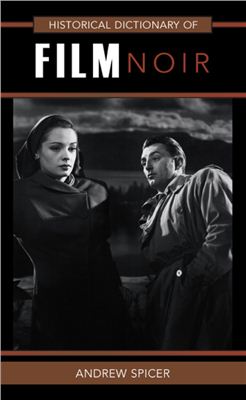Scarecrow Press, 2010. - 473 pp.
Film noir literally "black cinema" is the label customarily given to a group of black and white American films, mostly crime thrillers, made between 1940 and 1959. Today there is considerable dispute about what are the shared features that classify a noir film, and therefore which films should be included in this category. These problems are partly caused because film noir is a retrospective label that was not used in the 1940s or 1950s by the film industry as a production category and therefore its existence and features cannot be established through reference to trade documents.
"The Historical Dictionary of Film Noir" is a comprehensive guide that ranges from 1940 to present day neo-noir. It consists of a chronology, an introductory essay, a bibliography, a filmography, and over 400 cross-referenced dictionary entries on every aspect of film noir and neo-noir, including key films, personnel (actors, cinematographers, composers, directors, producers, set designers, and writers), themes, issues, influences, visual style, cycles of films (e.g. amnesiac noirs), the representation of the city and gender, other forms (comics/graphic novels, television, and videogames), and noir's presence in world cinema. It is an essential reference work for all those interested in this important cultural phenomenon.
Film noir literally "black cinema" is the label customarily given to a group of black and white American films, mostly crime thrillers, made between 1940 and 1959. Today there is considerable dispute about what are the shared features that classify a noir film, and therefore which films should be included in this category. These problems are partly caused because film noir is a retrospective label that was not used in the 1940s or 1950s by the film industry as a production category and therefore its existence and features cannot be established through reference to trade documents.
"The Historical Dictionary of Film Noir" is a comprehensive guide that ranges from 1940 to present day neo-noir. It consists of a chronology, an introductory essay, a bibliography, a filmography, and over 400 cross-referenced dictionary entries on every aspect of film noir and neo-noir, including key films, personnel (actors, cinematographers, composers, directors, producers, set designers, and writers), themes, issues, influences, visual style, cycles of films (e.g. amnesiac noirs), the representation of the city and gender, other forms (comics/graphic novels, television, and videogames), and noir's presence in world cinema. It is an essential reference work for all those interested in this important cultural phenomenon.

